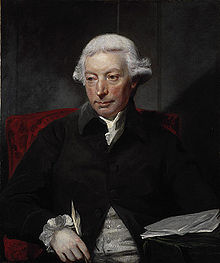Adam Ferguson
Scottish philosopher and historian; (1723-1816)
Adam Ferguson (June 20, 1723 – 22 February 1816) was a Scottish moral philosopher and historian of the Scottish Enlightenment.

Quotes
edit- Eighth Edition
- The attainments of the parent do not descend in the blood of his children, nor is the progress of man to be considered as a physical mutation of the species.
- PART I, SECTION I.
- Love is an affection which carries the attention of the mind beyond itself, and is the sense of a relation to some fellow creature as to its object.
- PART I, SECTION II.
- Mankind have always wandered or settled, agreed or quarrelled, in troops and companies.
- PART I, SECTION III.
- We are fond of distinctions; we place ourselves in opposition, and quarrel under the denominations of faction and party, without any material subject of controversy.
- PART I, SECTION IV.
- Men are to be estimated, not from what they know, but from what they are able to perform.
- PART I, SECTION V.
- The history of mankind is confined within a limited period, and from every quarter brings an intimation that human affairs have had a beginning.
- PART II, SECTION I.
- Man, in his animal capacity, is qualified to subsist in every climate.
- PART III, SECTION I.
- …if we intend to pursue the history of our species in its further attainments, we may soon enter on subjects which will confine our observation to more narrow limits. The genius of political wisdom and civil arts appears to have chosen his seats in particular tracts of the earth, and to have selected his favourites in particular races of men.
- PART III, SECTION I.
- Every step and every movement of the multitude, even in what are termed enlightened ages, are made with equal blindness to the future; and nations stumble upon establishments, which are indeed the result of human action, but not the execution of any human design.
- PART III, SECTION II.
- In every commercial state, notwithstanding any pretension to equal rights, the exaltation of a few must depress the many.
- PART IV, SECTION II.
Institutes of Moral Philosophy (1769)
edit- Theory consists in referring particular operations to the principles, or general laws, under which they are comprehended; or in referring particular effects to the causes from which they proceed.
- Introduction, Section IV, Of Theory, p. 7.
Quotes about Ferguson
edit- When Adam Ferguson summed up such teaching by defining the savage as a man who did not yet know property (1767/73:136), and when Adam Smith remarked that `nobody ever saw one animal by its gestures or natural cries signify to another, this is mine, that is yours' (1776/1976:26), they expressed what, in spite of recurrent revolts by rapacious or hungry bands, had for practically two millennia been the view of the educated. As Ferguson put it, `It must appear very evident, that property is a matter of progress' (ibid).
- Friedrich Hayek, The Fatal Conceit (1988), Ch. 2: The Origins of Liberty, Property and Justice.